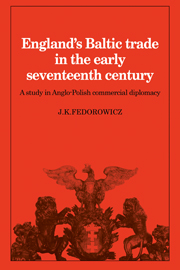 England's Baltic Trade in the Early Seventeenth Century
England's Baltic Trade in the Early Seventeenth Century Book contents
- Frontmatter
- Contents
- Preface
- List of maps and graphs
- List of abbreviations
- Map
- Introduction
- 1 English perceptions of the Polish Commonwealth
- 2 The mechanics of English diplomacy in the Eastland
- 3 The early history of the Eastland Staple at Elbing
- 4 The operation of the staple
- 5 The pattern of English shipping into the Baltic
- 6 English exports to the Baltic
- 7 English imports from the Baltic
- 8 The threat to the Eastland Staple at Elbing
- 9 The depression of 1620 and the crisis of England's Baltic trade
- 10 The political crisis, 1620–9
- 11 The mission of Sir Thomas Roe to the Eastland
- 12 Attempts at reconciliation with Danzig, 1630–5
- 13 The climax of English commercial diplomacy, 1635–42
- 14 Conclusion
- Notes
- Bibliography
- Index
12 - Attempts at reconciliation with Danzig, 1630–5
Published online by Cambridge University Press: 05 November 2011
- Frontmatter
- Contents
- Preface
- List of maps and graphs
- List of abbreviations
- Map
- Introduction
- 1 English perceptions of the Polish Commonwealth
- 2 The mechanics of English diplomacy in the Eastland
- 3 The early history of the Eastland Staple at Elbing
- 4 The operation of the staple
- 5 The pattern of English shipping into the Baltic
- 6 English exports to the Baltic
- 7 English imports from the Baltic
- 8 The threat to the Eastland Staple at Elbing
- 9 The depression of 1620 and the crisis of England's Baltic trade
- 10 The political crisis, 1620–9
- 11 The mission of Sir Thomas Roe to the Eastland
- 12 Attempts at reconciliation with Danzig, 1630–5
- 13 The climax of English commercial diplomacy, 1635–42
- 14 Conclusion
- Notes
- Bibliography
- Index
Summary
The cloth boycott
Despite Roe's best efforts, the situation in Poland promised no early improvement. The Eastland Company persisted in its complaints of losses at sea, war, and the pressure of competition from interlopers and foreigners. Its only remedy was directed primarily at the problem of competition at home and this was to renew and strengthen the Proclamation of 1622. The evident improvement in the English share of England's trade following that act (see table 9.7, pp. 170–1) gave cause for optimism and a belief that a repetition of the act with stricter provisions would have similar effects. The Privy Council set up a committee to study the petition, but it had to consider the matter only briefly and gave its approval. On 7 March 1630, the Proclamation was renewed with slight modifications which ensured that the Eastland Company should have the sole right of export to the Baltic and the sole right of import from that area, by rectifying defects in the original proclamation which did not specifically prohibit import of Baltic commodities by aliens from non-Baltic ports.
The Proclamation was followed by some English complaints on the part of smaller ports, which claimed that the Eastland Company supplied them only poorly with necessary commodities as compared with foreign merchants, or that its monopoly caused high prices. In Danzig, however, the news of the Proclamation was received with profound hostility. The city saw in the act a monopoly which would exclude its merchants from trading to England just as effectively as the city's seal prevented the English from trading anywhere else but to Danzig.
- Type
- Chapter
- Information
- England's Baltic Trade in the Early Seventeenth CenturyA Study in Anglo-Polish Commercial Diplomacy, pp. 207 - 224Publisher: Cambridge University PressPrint publication year: 1980
